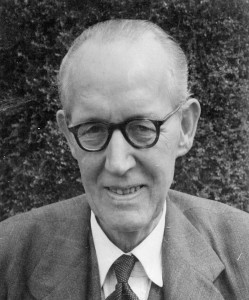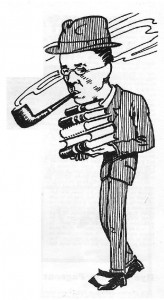Gilbert Fabes was born on January 6th, 1894, in one of the severest winters of the century. His family lived in a small working-class house in Stanford Street, off the Vauxhall Bridge Road, Westminster.

Not far away across the Thames, in Kennington, Charlie Chaplin was a young boy living a similar life: a street kid raised in the rough and tumble of low life of London. Gilbert was educated at Burdett-Coutts “Higher Grade ” School which was endowed by the famous Victorian philanthropist, the Baroness Burdett-Coutts, where the weekly fees ranged from two-pence to eight pence a week, depending on the child’s age. He won a scholarship entitling him to go to the Westminster Grammar School, but declined this because of his great love for his own school, where he became head boy.
At the age of fourteen, his father got him his first job -as a telegraph boy. At that time they were the butt of street arabs whose traditional insult was to pelt them with rotten apples to the cry of “Pick-pick-pick-a-narny! Who killed the cat, with the blood rahnd his hat? Pick a narny”. This cat call was probably derived from “pig in harness”, used in other parts of the country. At aged sixteen, he sat for an examination to gain promotion, passed easily, but failed because he was half inch short of the required height of five feet, four inches …by the age of seventeen he had gained two inches! That half-an-inch failure was a turning point in his career.
His next job was an office boy with the firm of Putnam in Bedford Street, Strand, at a weekly wage of ten shillings. Hours: nine to five-thirty each day and one o’’ clock on Saturdays. He rose to be a junior clerk and at the age of twenty he joined the County of London Yeomanry, the “Sharpshooters”, as a trooper. In 1916 he was drafted to the 10th (Irish) Division in Macedonia, as a mule driver in the Fifth Royal Irish Fusiliers.
After the war, Mr. Fabes returned to the firm and his beloved world of books. His strong sense of individualism and desire for independence was soon developed. With a silver “handshake” of £120 from his firm he set up his first business on his own from his home in Forest Hill. He sold literally “out of the bag”. Nevertheless, in the first year his turnover was over a thousand pounds. Three years later, in 1927 he accepted the post as Manager of the Rare Book Department at Foyles. Trade was at a low ebb and the nation was still suffering from the doleful “twenties” and the General Strike”. Then came the remarkable “Wall Street Boom” when speculation in rare books, among other collectable treasures, reached incredible heights of increased values.

It was in this period that Mr., Fabes became a recognised authority in the book world. His first work,”The autobiography of a Book” published in 1927, was well reviewed in several journals. Nine other books followed during the next seven years, mainly concerned with bibliography and information for book-collectors, several of these now command prices far in excess of their published prices.
He wrote book articles for many journals, here and abroad and his pseudonym of “The London Bookman” became well known in literary circles.
MR. FABES MEETS BERNARD SHAW
Among his many anecdotes he recalls the day when he was on library steps in the Rare Book Department when a voice with an Irish accent, said quietly, “I believe you buy books”. He turned and the voice continued,”I am Bernard Shaw”.
“Yes I know that”, replied Mr. Fabes.
The great man was moving from his home in Adelphi Terrace and wished to dispose of his surplus books. Mr. Fabes maintains that Shaw’s reputation as an “ogre” and consumer of the insignificants is unwarranted. “I found him a most charming man”, he said, but he disliked being ‘cowtowed’ to. “He was deeply human. . . you could see that by the twinkle in his eyes.”
On the occasion of their second meeting, Mr. Fabes played a jolly game of “one-upmanship” with him. The quicker the repartee, the more “G.B.S.” enjoyed it, quite contrary to the popular myth, he took no offense, where none was intended. He gave Mr. Fabes a fine signed portrait which is forever treasured.
In 1932 came the “slump” and for five years, Gilbert Fabes worked with Meyers and Co., Booksellers, in New Bond Street. Then once more with the help of a loan from a friendly customer he went “on his own” and had a book salon in the West
Central of London. Hopes were again deferred by the outbreak of the Second World War. He closed the business and evacuated his family to his caravan (an old Hastings tram converted) to Winchelsea Beach, behind Holford’s Farm. From “The Forsyte Caravan” he issued his next catalogue-probably the first bookseller to ever do so.
Always a lover of Sussex, this caravan was a “pied-a-terre” which proved to be of lasting significance. He joined the Coast Watchers, and later the “L.D.V.”, later called “The Home Guard”, and he was on duty on the night of June 29th, 1940, when the alert was given that the Germans were likely to drop parachutists on the marshes. This event, which happily did not occur, was later dramatised by the well-known author C.S.Forester, who once lived in Winchelsea, and he described the situations which would have developed in these parts, if the invasion had happened and the locality had become the first ground of a Nazi invasion.Winchelsea Beach was taken over entirely by the military in July, 1940, and Mr. Fabes returned to his home at Forest Hill, in time to endure the “Battle of Britain”. Nevertheless, determined to carry on, he issued another book catalogue, in which he invited customers with the laconic note printed in it: ”. . . callers will be welcome and an air-raid shelter is in the garden”.
The climb to independence was hard, but an offer to become manager of the Rare Book Department of Hatchards famous book shop in Picadilly was gladly accepted. It was a big challenge for the department was in disorder and had only an unprofitable turnover of about five thousand a year. He reorganized the whole department to such an extent that, beginning with only one elderly assistant, he finished with five and a record turnover for one year of over twenty-nine-thousand pounds. Royal Warrants were held by one of the directors of the firm, and many royal personages and famous people were customers. Queen Mary, the Duke of Gloucester, the Duchess of Kent and children, Lady Astor, numerous well-known authors and military leaders, despite the bombing were frequent customers. The managing-director and part-owner at that time was the financier Clarence Hatry, who had served ten years of his fourteen years’ sentence for fraud, in Maidstone Gaol . . . mostly in the library there!
In May, 1945, having terminated his engagement with Hatchards, Mr. Fabes moved from London to “The Willows”, Sea Road, Winchelsea and in November of that year he at last realised his ambition to open a real bookshop in a small country town. For twenty years he traded from the shop at the corner of Rye High Street and Market Road. It is part of his philosophy never to be idle, rich or poor. In his shop he could put into practice his ideas of private enterprise . . . “A customer should be made to feel more than just a customer. You should get to know the person, who must feel at home and relaxed”.
.A sign in his window read: “You will find pleasure in making books your friends. Come in and browse around”.
SHILLING BARGAINS
In 1949 he bought the library of the late Henry James, from Lamb House, though much of it had been damaged in the war. Many of the volumes were personally inscribed to him by famous authors who had visited or stayed at the house and a selection of these, by arrangement with the National Trust, is now preserved in Lamb House.
One of Mr. Fabes many anecdotes about customers was connected with his outside “Shilling Bargains”, when a nun, after much contemplation, purchased a red cloth book and paid his lady assistant for it. He asked her what was the title of the book the nun had purchased. “A Damsel In Distress”, was the reply!
His outside interests included Freemasonry- he held London Grand Rank, and Rotary being Founder Secretary of the Rye and Winchelsea Rotary Club. But literature – written or writing always dominated his life. He was fond of animals, especially horses and dogs. He was married in 1920 and celebrate his Golden Wedding in 1970. He had two children. One of his professional tips to book-collectors: “Obviously the first editions of Winston Churchill’s works will increase in value, especially his earliest books and his major works, and more especially if inscribed by Churchill. One item which might be found in any attic or bundle of “rubbish” is “Mr. Brodrick’s Army”, a little book of about a hundred pages, originally published at one shilling and now worth at least £200 if in fine condition.
Gilbert Fabes was a familiar and popular character around the streets of Rye. Rarely seen without his pipe or trilby. He had moved to Ashenden Avenueand after his death in 1973. His wife —– outlived him by nearly thirty years, maintaining the same house and garden into her 97th. year. There is a commemorative seat to Gilbert Fabes in the High Street
The bulk of information contained in this article was researched by Andrew Page in 1968.
“Rye’s Own” January 2004
All articles, photographs and drawings on this web site are World
Copyright Protected. No reproduction for publication without prior
arrangement